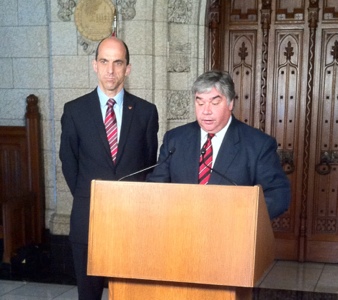So, remember what I was saying yesterday about how the opposition – and the NDP in particular would be hammering away at the government in QP about the omnibus budget bill if they truly considered it to be the major priority and affront to democracy that it is? Well, it only took them until the end of the second round – a full 25 minutes into QP – to ask a pair of broad and general questions about the omnibus nature of the bill, and 38 minutes to ask a couple of substantive questions about a particularly troubling measure within it (and didn’t take the parliamentary secretary to task for her nonsense answer during the supplemental question, like they should have). Apparently this constitutes taking an existential threat to parliamentary democracy seriously.
What’s that? More problems with defence procurements that say they’re going to be one thing (in this case vehicular power transmission components) and turns out to be something else (13 armoured vehicles)? You don’t say! Meanwhile, the military says that Peter MacKay would have known the actual cost estimates of the Libya mission when he reported a much lower figure to parliament. I am shocked – shocked!
The RCMP Commissioner has sent warning letters out to provincial commissioners of firearms to warn against setting up backdoor long-gun registries. The problem of course is that he doesn’t exactly have the ability to meddle in provincial jurisdiction like he – and Vic Toews – would like to on this issue.
The Public Service Commission is investigating whether eleven employees were improperly hired at ACOA due to political interference.
Here’s a more in-depth look at the situation that MDA finds itself in while the government drags its feet on signing the contract for the next phase of the RADARSAT constellation.
Harper and his team continue to try and get Helena Guergis’ lawsuit against them dismissed.
The punitive measures that the Conservatives and NDP imposed on the Liberals around campaign financing retroactively on the 2006 leadership race continues to haunt some of the former contenders.
Here’s a bit of an explainer of what some of the latest “Pierre Poutine” revelations mean.
And Lisa Raitt talks about her battle with post-partum depression to help raise awareness of mental health.

